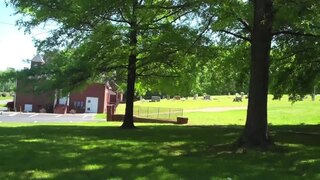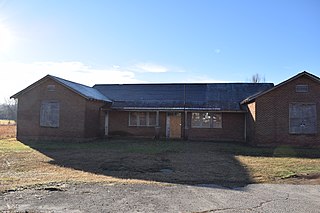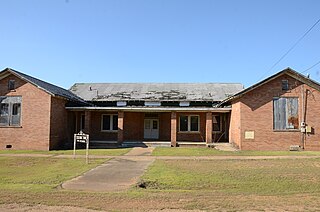
Hardeman County is a county located in the U.S. state of Tennessee. As of the 2020 census, the population was 25,462. Its county seat is Bolivar.

Whiteville is a town in Hardeman County, Tennessee, United States. The population was 2,606 at the 2020 census and 4,638 at the 2010 census, Whiteville is the location of two privately owned prisons, Whiteville Correctional Facility and Hardeman County Correctional Center. Whiteville is also home to Allen-White School, a former Rosenwald school that was placed on the National Register of Historic Places in 2005.

The Rosenwald School project built more than 5,000 schools, shops, and teacher homes in the United States primarily for the education of African-American children in the South during the early 20th century. The project was the product of the partnership of Julius Rosenwald, a Jewish-American clothier who became part-owner and president of Sears, Roebuck and Company and the African-American leader, educator, and philanthropist Booker T. Washington, who was president of the Tuskegee Institute.

Dunbar Gifted & Talented Education International Studies Magnet Middle School is a magnet middle school for students in grades 6 through 8 located in Little Rock, Arkansas, United States. Dunbar Magnet Middle School is administered by the Little Rock School District. It is named for the nationally known African-American poet, Paul Laurence Dunbar.

Cairo Rosenwald School is a former school for African-American children located in the unincorporated community of Cairo, Sumner County, Tennessee. It was one of seven Rosenwald schools built in the county.

Durham's Chapel School, also known as Durham's Chapel Rosenwald School, is a former school for African-American children located in Gallatin, Tennessee, that is listed on the National Register of Historic Places.

Liberty Colored High School is a former high school for African-American students in Liberty, South Carolina during the period of racial segregation. It originally was called Liberty Colored Junior High School. The building is now a community center known as the Rosewood Center. It is at East Main Street and Rosewood Street in Liberty. The school was built in 1937 on the site of a Rosenwald school that had burned down.

The Beauregard Parish Training School in DeRidder, Louisiana, was a school for black students and black teachers in training. The two school buildings, located on the original property at the corner of Martin Luther King Drive and Alexandria Street, were the first African-American related structures in southwestern Louisiana to be listed in the National Register of Historic Places, on March 1, 1996.
Guildfield Missionary Baptist Church is a historic African-American church on Guildfield Church Road in South Guthrie, Tennessee.
Triune is an unincorporated community in eastern Williamson County, Tennessee, approximately halfway between Franklin and Murfreesboro. The community is located along the Wilson Branch of the Harpeth River. The intersection of former local roads State Route 96 and the concurrency of U.S. Routes 31A and 41A is here. The community is located just north of these roads interchange with Interstate 840.
Samuel L. Smith was a school administrator and practical architect involved in school design for Rosenwald Schools.

The Second Union School is a historic Rosenwald school building for African-American children located near Fife, in western Goochland County, Virginia. It was built in 1918, as a two-teacher school, near Second Union Baptist Church, which had been founded in 1865 as an independent black congregation.

Pocahontas School is a historic school building in Pocahontas, Tennessee, that is listed on the National Register of Historic Places.

The Chicot County Training School was a historic school building at the corner of Hazel and North School Streets in Dermott, Arkansas. The single story H-shaped building was built in 1929 with funding support from the Rosenwald Fund, a major philanthropic effort to improve educational opportunities for African-Americans. The school was preceded by Dermott Baptist Industrial School, co-founded by Isaac George Bailey, and then Morris Booker High School and Memorial College. It was succeeded by Morris Booker Memorial College. The building was listed on the National Register of Historic Places in 2004. The school building collapsed and burned after being abandoned. It was delisted from the National Register in 2022.
South Guthrie is an unincorporated rural community in Montgomery County, Tennessee, immediately south of the Kentucky state line.

The Lafayette County Training School is a historic school building at 1046 Berry Street, on the former campus of Ellis High School in Stamps, Arkansas. It is a single-story brick building with a gable roof, built-in 1929 with assistance from the Rosenwald Fund. It is laid out in the shape of an H, and houses six classrooms in the side wings, with an office, library, and auditorium in the center. It is the only surviving Rosenwald School in Lafayette County. It served the area's African-American student population until 1969 when the county schools were integrated. It thereafter served as an integrated middle school until 1975, and for a time as a daycare center afterwards.

Lee County Training School, also known as the W. B. Wicker School, is a historic school building located at Sanford, Lee County, North Carolina. It is a one-story brick building dating to 1927 with additions in 1934 and 1949. The building is characterized by large windows alternating with pilasters and was built by contactor A.L. “Link” Boykin, a leading member of Sanford’s black community. Construction funds were provided in part by the Rosenwald Fund, conceived in the 1910s by Southern black leader and educator Booker T. Washington. The Rosenwald schools were built across the south for black Americans in the early 20th century. It served as Sanford and Lee County's African American high school until it was decommissioned as a high school in 1969. Until the year 2019, classes for grade school were last held at the school in the late 1980s. It was listed on the National Register of Historic Places in 2000.
The Bolivar-Somerville Stage Road is a historic stage road in Tennessee. A 2.3 miles (3.7 km) section about four miles southwest of Whiteville was listed on the National Register of Historic Places in 2005.
George Washington Carver High School was a public secondary school in Brownsville, Tennessee. It served as the high school for black students until the public schools were integrated.
A training school, or county training school, was a type of segregated school for African American students found in the United States and Canada. In the Southern United States they were established to educate African Americans at elementary and secondary levels, especially as teachers; and in the Northern United States they existed as educational reformatory schools. A few training schools still exist, however they exist in a different context.















